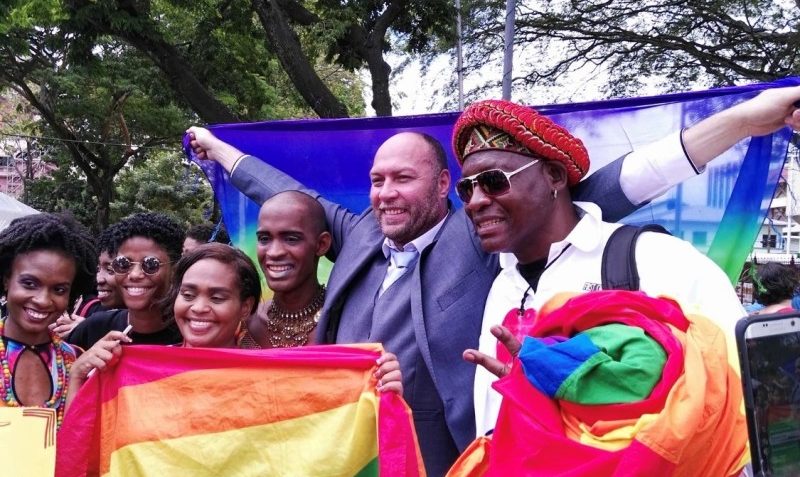Alliance salutes landmark LGBT rights case against Trinidad & Tobago

LGBT activist wins a legal case against the government of Trinidad & Tobago challenging the legality of law prohibiting same-sex relations.
In a landmark ruling, LGBT activist Jason Jones has won a legal case against the government of Trinidad and Tobago challenging the legality of a law prohibiting same-sex relationships.
Jason Jones celebrates his historic win against the government of Trinidad and Tobago
Trinidad and Tobago was one of 37 countries in the Commonwealth which criminalise homosexuality. The ruling gives lesbian, gay, bisexual and transgender (LGBT) activists renewed hope to challenge the 36 Commonwealth governments who continue to criminalise their relationships.
Jones said: “This victory is much more than just the legal challenge and constitutional reforms. It is a rallying cry for the LGBT community and our allies to stand up and be counted! This represents the first moment in the history of the English speaking Caribbean that we have become truly visible and in a populist and meaningful manner. Yes, there was pushback but we are pushing forward in ways never seen before. This is the Rosa Parks moment for LGBT people of the Caribbean and we shall NEVER sit in the back of the bus again.”
Criminalisation of LGBT people
Under sections 13 and 16 of Trinidad and Tobago’s Sexual Offences Act 1986, Trinidad and Tobago’s ‘buggery’ law imposed 25 years’ imprisonment, and five years for ‘serious indecency’ for intimacy between two women or two men.
Alongside significant pro-bono support from a legal team, led by Richard Drabble QC, as lead counsel, Jason also received funding from the International HIV/AIDS Alliance’s Rapid Response Fund, which is supported by the Elton John AIDS Foundation.
Richard Drabble QC, said: “Under international law it is accepted that criminalisation of private sexual relationships between consenting adults constitutes a breach of fundamental human rights.” It was on this basis that the legal team challenged Trinidad and Tobago’s law prohibiting same-sex relationships.
Shaun Mellors, director of knowledge and influence at the Alliance, said: “This is an important landmark decision, which I hope will be the start of a domino effect for the remaining countries in the Commonwealth who still have these discriminatory laws in place. We know that criminalisation increases vulnerability and impacts the ability of the LGBT community to access health and HIV services, so this is one step closer to breaking down these barriers. The successful outcome of the case demonstrates the power of personal belief and commitment to justice and fighting for what is right.”
Colonial legacy of criminalisation in Commonwealth
This historic case is a result of four High Court Case management hearings over nine months in 2017, which finally led to the case being heard at the High Court of Trinidad and Tobago in January 2018. Half of the world’s countries that still criminalise homosexuality are in the Commonwealth. The existence of these laws underpins stigma and discrimination that can lead to violence and harassment, effectively criminalising LGBT identities and relationships.
Theresa May, prime minister of the UK, issued a timely apology during the Commonwealth Heads of Government Meeting in London this week for Britain’s role in introducing anti-homosexuality laws during its colonial rule.
When Jones launched his case, he had support from Michael Cashman, founder of Stonewall, who said: “Politicians should have at the top of their job description ‘the courage to be unpopular’. They have to lead opinion. It’s incumbent on politicians to act in advance of public opinion.”
Prime Minister Theresa May has made a start, but the Alliance looks forward to seeing her apology backed by action to fund and engage diplomatically in support of law reform to end criminalisation of same-sex relationships in commonwealth countries.
Long journey to realise LGBT rights
It has been, and continues to be, a long and difficult road for Jones as a gay man of mixed heritage, who is challenging Caribbean expectations of manhood.
“In choosing this journey I felt it was what I was put on this planet to do,” said Jones. “I have conducted this challenge completely independently with no assistance or backing. International agencies blacklisted me and prevented my accessing funding. I sold my mother’s jewellery to stay afloat. Then miraculously, the International HIV/AIDS alliance threw me a lifeline in January 2017 and that funding allowed me to get the case filed with the high court of Trinidad and Tobago.
“Why did I do it? Because I am a product of homophobia. I have lost so much – family, friends and even my boyfriend could not take being second fiddle to my work. I am a man possessed. I don’t want anyone else to have to go through the difficulties that I faced in Trinidad simply for being myself and loving someone of the same sex.
“So what happens next? I, and my Amazing legal team, will go to the Privy Council to answer the appeal by my government of this historic and ground-breaking judgement. Three more years before I win at the Privy. Then and only then, will this job be done!”
Jason Jones was assisted by a grant from the Rapid Response Fund, which is managed by the International HIV/AIDS Alliance and funded by the Elton John AIDS Foundation. The Fund makes grants to LGBT and MSM organisations so they can carry out urgent work to alleviate the stigma, discrimination and violence that threaten provision, access and uptake of HIV services for MSM and LGBT people.
This article was written as the International HIV/AIDS Alliance, before we changed our name to Frontline AIDS.
Tags
Elton John AIDS FoundationLGBTPolicy and legalRapid Response FundTrinidad and Tobago


